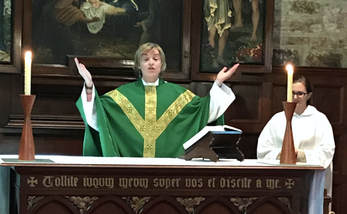
It can be so hard to bear the sword in our soul, can’t it? Where can we put the pain and desire that cannot be expressed, the words and love that cannot be spoken? Only here perhaps, in eucharistic offering. In doing so, we are not only given the capacity to bear the sword, but even to anticipate and taste its transformation. It makes no sense to many. It never has. Yet in the paschal mystery of the eucharist, we discover that all things are possible and re-created. As Jesus says, in the words of our Gospel today, as we thereby enter the paschal mystery: ‘blessed are your eyes, for they see, and your ears, for they hear. Truly I tell you, many prophets and righteous people longed to see what you see, but did not see it, and to hear what you hear, but did not hear it.’ To be part of this, and to enable this, is why I am a priest.
When I first presided at the eucharist, it was indeed a somewhat painful and very humble affair. That was unusual. Most of the men with whom I was priested presided at special, very joyful occasions, full of the very best Anglo-Catholic splendour - and with some gorgeous chasubles and other delightful frocks :-) In my conflicted state, I chose our routine mid-week eucharist, in the side-chapel of St John-at-Hackney, in the challenging east end of London, where, usually literally, just two or three would gather in Christ’s Name. On this occasion, my vicar joined me together with Penny and another female deacon friend. I remember the two ot them crying on the back row. I know that, in spirit, I was also with them, spilling tears.
Looking back today, I am actually glad that I went through that first experience of priestly presiding in that way. Now of course I do not treasure the sadness that was involved, and the continued hurt which others feel who continue to be excluded from full participation in their own holy callings today. Yet it was ultimately right and enough. It made me a better priest than I might have been. For the eucharist, though rightfully celebrated as a many-splendoured thing, is not about priestly show or pietistic pomp. It is so very much about the humble and the ordinary, the glory in our brokenness, and the bearing and transforming of the swords in our souls.
Let me conclude with a recent experience, at Brisbane’s Metropolitan Community Church last Sunday evening. It was a special and very joyful gathering, with interstate and MCC international leaders present. At the heart of it however was the eucharist, presided over by the Revd Darlene Garner, a profoundly loving and wise African-American lesbian woman. As she led us into eucharistic prayer and participation, she reminded us of how the Last Supper was not a glamorous tea party, but most likely a cramped and confining upper room above a smelly stable; of how it would not have been simply thirteen cis-gender men as it is often portayed (thank you Leonard da Vinci!), but a community gathering of all kinds of us, in all our wondrous human variety; and, above all, of how what we remember in the eucharist was a call to see God present among all of this, among all of us, and a call to hear the music of God’s love inviting us to make this real for others too. As Jesus says to us again in this sacrament today: ‘blessed are your eyes, for they see, and your ears, for they hear. Truly I tell you, many prophets and righteous people longed to see what you see, but did not see it, and to hear what you hear, but did not hear it.’ Are our eyes awake, our ears open? It is in our brokenness that we find God’s completion; in our shared pain that Christ renews our joy; in the swords that pierce our souls, healing for every heart. Let me therefore leave it to the late great Leonard Cohen to lead us into prayer, in his song ‘Come Healing’…
by Jo Inkpin, for St Francis College midweek eucharist, Thursday 27 July, 2017 Matthew 13.10-17
 RSS Feed
RSS Feed